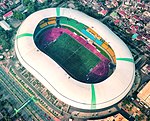Cibitung railway station
Bekasi RegencyRailway stations in West JavaRailway stations opened in 1990

Cibitung Station (CIT) is a railway station located in Wanasari, Cibitung, Bekasi Regency. The station, which is located at an altitude of +19 meters, is included in the Operation Area I Jakarta. Previously the station was small, 1.5 × 1.5 meters wide and only functions as a ticket sales counter. The station platform is low and short. The station building was then enlarged to meet the extension of the KRL Commuterline blue line towards Cikarang.The station is quite busy because it is located near housing complexes.
Excerpt from the Wikipedia article Cibitung railway station (License: CC BY-SA 3.0, Authors, Images).Cibitung railway station
Jalan Raya B. Bosih, Kabupaten Bekasi Trias
Geographical coordinates (GPS) Address Nearby Places Show on map
Geographical coordinates (GPS)
| Latitude | Longitude |
|---|---|
| N -6.261879 ° | E 107.083664 ° |
Address
Cibitung
Jalan Raya B. Bosih
10350 Kabupaten Bekasi, Trias
West Java, Indonesia
Open on Google Maps







